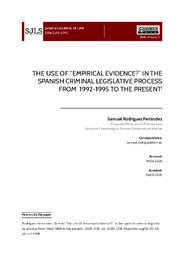Por favor, use este identificador para citar o enlazar este ítem:
https://hdl.handle.net/11000/27410Registro completo de metadatos
| Campo DC | Valor | Lengua/Idioma |
|---|---|---|
| dc.contributor.author | Rodríguez Ferrández, Samuel | - |
| dc.date.accessioned | 2022-06-03T08:31:25Z | - |
| dc.date.available | 2022-06-03T08:31:25Z | - |
| dc.date.created | 2020-12-01 | - |
| dc.identifier.citation | nº2(2020) | es_ES |
| dc.identifier.issn | 2695-5792 | - |
| dc.identifier.uri | http://hdl.handle.net/11000/27410 | - |
| dc.description.abstract | The purpose of this paper is to analyse the introductory texts of the various Organic Laws that have shaped the text of our current Criminal Code over the last 25 years. Recourse to these introductory texts (whether they are Explanations of Reasons or Preambles, as we shall see below) is obligatory -at least as a first source of information- if we wish to know which have been throughout this period the reasons given by the different criminal legislators for undertaking the multiple reforms that have been approved and came into force. As a methodological alternative, we could have resorted to the reports that the different governments have been sending to Parliament to justify the initial bills of all the Organic Laws analysed, in order to appreciate a perhaps more “pure” version of the reasons of the legislative promoter; however, apart from the fact that the information contained in both types of justification-explanation text usually coincides in essence, that of the Organic Laws offers more up-to-date information that is in line with the final text of the approved regulation and, above all, it is much easier to access it, without having to make an individual request for the documentation attached to each bill to the “Office of Documentation, Library and Archives” of the Congress of Deputies | es_ES |
| dc.format | application/pdf | es_ES |
| dc.format.extent | 27 | es_ES |
| dc.language.iso | eng | es_ES |
| dc.publisher | Universidad Miguel Hernández de Elche | es_ES |
| dc.rights | info:eu-repo/semantics/openAccess | es_ES |
| dc.rights | Attribution-NonCommercial-NoDerivatives 4.0 Internacional | * |
| dc.rights.uri | http://creativecommons.org/licenses/by-nc-nd/4.0/ | * |
| dc.subject.other | 34 - Derecho::340 - Cuestiones generales de derecho. Métodos y ciencias auxiliares del derecho | es_ES |
| dc.title | The use of “empirical evidence?” in the spanish criminal legislative process from 1992-1995 to the present | es_ES |
| dc.type | info:eu-repo/semantics/article | es_ES |
| dc.identifier.doi | 10.21134/sjls.vi2.1288 | - |
| dc.relation.publisherversion | https://doi.org/10.21134/sjls.vi2.1288 | - |

Ver/Abrir:
1288-Article Text-6362-1-10-20211022.pdf
275,54 kB
Adobe PDF
Compartir:
 La licencia se describe como: Atribución-NonComercial-NoDerivada 4.0 Internacional.
La licencia se describe como: Atribución-NonComercial-NoDerivada 4.0 Internacional.
.png)